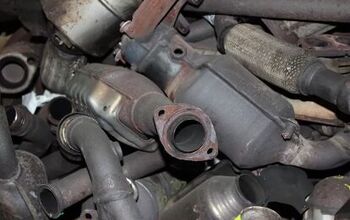European Automakers Think Fuel Taxes Will Increase EV Sales

Undoubtedly eager to improve the take rate of electric vehicles, automakers have a myriad of solutions at their disposal. But the majority have something to do with getting the government involved to futz around with taxes.
Normally, this has to do with making special exceptions for EVs or subsidizing them via rebate programs. But governments seem happy to do this, as increasingly more legislation is advanced that would place restrictions on when and where people will be able to drive internal combustion vehicles, and automakers appear to be getting with the program. We’ve already seen manufacturers choosing sides in America’s gas war and now the Europeans are getting in on the action by demanding higher taxes be imposed on vehicles reliant on gasoline or diesel.
It has not appeared to slow its advance, however.
In a recent interview with The Wall Street Journal, Audi CEO Markus Duesmann said he would like to see internal combustion vehicles subjected to new fees. But he’s just one of several top executives from various automotive manufacturers that are asking the EU to impose more fuel taxes on vehicles that burn them — that way EVs can become more competitive without the industry needing to make them better in any technical sense.
“We need to tax carbon at the pump,” Duesmann stated.
From WSJ:
Traditional auto makers face a dilemma. The bulk of their business is still building and selling cars with internal-combustion engines—including family cars, big sport-utility vehicles and sports cars. Raising fuel taxes could hurt sales of those vehicles. But unless EVs can compete on price with conventional cars, it will be hard for auto makers to lure customers to them and recoup the vast investments manufacturers have made in the technology.
One avenue for the tax hikes is through carbon pricing — a dollar price on carbon emissions that sets a base for levies and taxes on emissions — which is one of the tools governments have deployed to fight greenhouse-gas emissions. Higher carbon pricing ultimately leads to higher prices for fossil fuels.
Herbert Diess, chief executive of Volkswagen AG, which owns Audi, has been calling for higher carbon-dioxide emissions for some time. He says the €25 price (about $29) Germany sets per ton of carbon emissions is too low and suggests Germany should price carbon more in line with Sweden, which sets the price at €100.
Truck manufacturers are also interested, with the CEOs of DAF, Daimler Truck, MAN, Scania, Volvo, and Ford’s European truck division jointly called for the EU to end support of diesel fuels late in 2020. While it sounds kind of insane, the industry has dumped billions into developing battery or hydrogen driven delivery trucks (something engineers from several of the world’s largest vehicle manufacturers have told me was both brilliant and totally insane/impossible) and envision a future where most cargo haulers are powered by electricity. But it’s not so cut and dried as just building new vehicles, European truck companies also wanted the government to base all future road tolls and fuel taxes on CO2 emissions and to tax energy based on its carbon content at the tailpipe — which would be great news for any fleets burning all of their measurable pollutants as the plant that’s providing the electricity.
“We need cost parity between hydrogen and diesel trucks,” Daimler Truck head Martin Daum was quoted as saying. “You have to switch to [charging for] CO2 and then you can play around with the rate.”
Germany’s biggest auto lobbying group, the VDA, has similarly suggested that the European Union make additional tax exemptions for vehicles that run on electricity or biofuels as a way to discourage customers from buying gasoline/diesel reliant cars. While it seems like a big ask, the government has actually been pretty receptive. The EU already has a plan to introduce new environmental rules over the summer and the presumed scenario involves a strong, organized push for tightening emissions regulations even further.
While we understand that it’s an effective strategy, it doesn’t seem to be one that’s actually catering to customers anymore. Regulations are definitely encouraging more people to buy electric but it’s coming from this twisted marriage between the state and industry that has increasingly less to do with saving the environment. Consumers are not blind to this and there may soon come a day where the backlash is far worse for the industry than any advantages provided by regulation. EVs do indeed seem to be the future. But they need to be gradually improved until they become the kind of vehicles that work for the customer, not treated as square pegs the industry has to hammer into a round hole by some arbitrary deadline determined by government officials and auto executives.
[Image: Nrqemi/Shutterstock]

A staunch consumer advocate tracking industry trends and regulation. Before joining TTAC, Matt spent a decade working for marketing and research firms based in NYC. Clients included several of the world’s largest automakers, global tire brands, and aftermarket part suppliers. Dissatisfied with the corporate world and resentful of having to wear suits everyday, he pivoted to writing about cars. Since then, that man has become an ardent supporter of the right-to-repair movement, been interviewed on the auto industry by national radio broadcasts, driven more rental cars than anyone ever should, participated in amateur rallying events, and received the requisite minimum training as sanctioned by the SCCA. Handy with a wrench, Matt grew up surrounded by Detroit auto workers and managed to get a pizza delivery job before he was legally eligible. He later found himself driving box trucks through Manhattan, guaranteeing future sympathy for actual truckers. He continues to conduct research pertaining to the automotive sector as an independent contractor and has since moved back to his native Michigan, closer to where the cars are born. A contrarian, Matt claims to prefer understeer — stating that front and all-wheel drive vehicles cater best to his driving style.
More by Matt Posky
Latest Car Reviews
Read moreLatest Product Reviews
Read moreRecent Comments
- Dartman EBFlex will soon be able to buy his preferred brand!
- Mebgardner I owned 4 different Z cars beginning with a 1970 model. I could already row'em before buying the first one. They were light, fast, well powered, RWD, good suspenders, and I loved working on them myself when needed. Affordable and great styling, too. On the flip side, parts were expensive and mostly only available in a dealers parts dept. I could live with those same attributes today, but those days are gone long gone. Safety Regulations and Import Regulations, while good things, will not allow for these car attributes at the price point I bought them at.I think I will go shop a GT-R.
- Lou_BC Honda plans on investing 15 billion CAD. It appears that the Ontario government and Federal government will provide tax breaks and infrastructure upgrades to the tune of 5 billion CAD. This will cover all manufacturing including a battery plant. Honda feels they'll save 20% on production costs having it all localized and in house.As @ Analoggrotto pointed out, another brilliant TTAC press release.
- 28-Cars-Later "Its cautious approach, which, along with Toyota’s, was criticized for being too slow, is now proving prescient"A little off topic, but where are these critics today and why aren't they being shamed? Why are their lunkheaded comments being memory holed? 'Who controls the past controls the future. Who controls the present controls the past.' -Orwell, 1984
- Tane94 A CVT is not the kiss of death but Nissan erred in putting CVTs in vehicles that should have had conventional automatics. Glad to see the Murano is FINALLY being redesigned. Nostalgia is great but please drop the Z car -- its ultra-low sales volume does not merit continued production. Redirect the $$$ into small and midsize CUVs/SUVs.


































Comments
Join the conversation
Anyone who’s paid attention knows German automakers have been resisting EU fleet fuel efficiency standards and the like because they dominate the gas-guzzling luxury car segment. The reason why we need CO2 taxes is because global warming is a huge externality and it’s all CO2 emitters, including the gas and coal-fired electric plants that Merkel is prolonging the life of due to her knee-jerk decision to shut down Germany’s extremely efficient and safe nuclear power plants. Unfortunately the EU grandfathered too many legacy polluters in its emission permit trading scheme so the actual prices were too low to change behaviors, and for instance by granting Germany 2.5x the credits of France, it actually rewards inefficiency and pollution.
I don't get harassed because most fellow riders are asleep coming and going. If you have plenty of money and you want to drive that is your choice but then if you complain about the price of fuel or the rising cost of vehicles then you don't get any sympathy. I can afford to drive but it is a waste of money since the parking alone costs more than the round trip fare and it only takes 30 minutes each way even if I had to pay the $4 a day round trip costs. I would much rather save and invest what I don't spend. Much less about being green as having more green in my wallet.